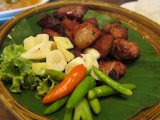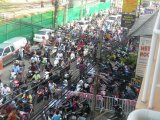PHUKET: Beer drinkers especially are paying an extra-high price for uncertainty about wages and food costs on Phuket, a survey of restaurants in Phuket City shows.
The eight restaurants surveyed are all in the Sam Kong district of Phuket City, perhaps the most popular dining out area for locals on the east side of Phuket.
Instead of adapting their menus to take account of fluctuating meat and vegetable prices and the new 300 baht minimum wage, most of the restaurants have simply chosen to slug drinkers first.
Prices for beer in many Phuket restaurants rose during the product shortages triggered by floods and broken supply lines last year as some greedy warehouse go-betweens cashed in on market demands.
Some restaurants have simply maintained those artificially high prices while others have returned to the extra hike for Phuket's drinkers as a simple but effective way of avoiding a general price rise for all customers.
Most of the diners at the restaurants in the survey are non-drinkers. Only one of the restaurants in the survey has maintained the cost of a large bottle of Singha beer at 65 baht, the price that most were charging six months ago.
The others have pushed the charge for a large bottle of Singha mostly to 80 baht or even 90 baht, and in one case 100 baht, with Heineken and other beer brands similarly more expensive too.
The impost on alcohol drinkers has the virtue of leaving most customers unscathed.
With uncertainty continuing to swirl around the prices of essential footstuffs and the impact of the generous rise in the minimum wage, restaurant price-setters are taking the easiest option: slug the drinkers.
The future for the national 300 baht daily minimum wage, introduced on Phuket and six provinces in and around Bangkok on April 1, remains unclear. All other provinces in Thailand are due to gain the minimum before 2013.
Yet serious doubts are still being raised about whether the implementation of the election campaign promise that helped sweep the Pheu Thai party to power is good for prices and especially the tourism industry.
Inflationary pressures are already at work that will take the cost of living higher and make Thai tourism less competitive.
The nationwide minimum replaced the system under the Democrat Government, where monthly adjustments were made to the wages in each province based on the CPI figures each month, in each province.
Differences in the cost of living in various provinces remain as dramatic as they were under the Democrats.
The final adjustment before last year's election left Phuket with a minimum daily wage of 221 baht, the highest of all Thailand's provinces.
One province at the other end of the scale had a minimum wage of 159 baht, based on its low cost of living.
In Phuket and the other provinces that have adopted the new daily minimum, there is no way of telling with certainty at present whether living costs are rising or falling.
Introduction of the 300 baht minimum in provinces where the previous rate paid was much lower that on Phuket or in the Bangkok region is bound to bring more confusion, as well as intense inflationary pressures.
The national government now seems to be as uncertain as everybody else is on the effects of its wages and prices policies. Fine tuning calibrations are a thing of the past, sacrificed to an election promise.
Needless to say, we'll be watching the price of alcohol in restaurants closely. That's probably as good a guide as any as to what will happen next.












On Phuket it's always been
"Sell less for more" and not "Sell more for less"
When the number of clients goes down, prices go up. Once up, they never come down.
Posted by Steve C. on May 15, 2012 09:34